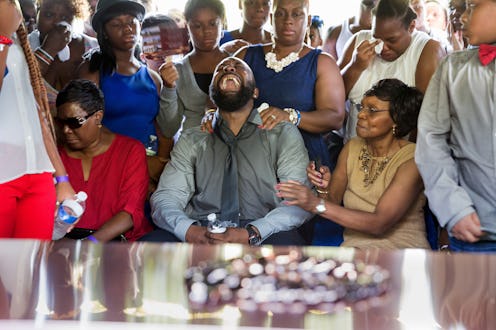News
What We Might Learn From The Michael Brown Lawsuit
In a press conference Thursday, Michael Brown's family announced they filed a lawsuit against the city of Ferguson under Missouri's "wrongful death statute," according to CNN, who cited a statement by the family's attorney, Benjamin Crump. Crump promised that the suit would unveil forensic evidence overlooked by previous investigators, which he claims will raise doubts about the police department's version of events between 18-year-old Brown and Ferguson Police Department Officer Darren Wilson. City of Ferguson spokesman Jeff Small declined to comment to CNN, but said the lawsuit had been received, but not read in full.
The suit seeks $75,000 in damages for Brown's family as well as attorney fees. In addition to the city of Ferguson, the suit will also target Wilson, who has since resigned from his position, and former police chief Thomas Jackson, who resigned from the department last month. Crump said in the statement:
The narrative of the law enforcement all across the country for shooting unarmed people of color is the same: That they had no other choice. But time and time again, the objective evidence contradicts the standard police narrative.
The lawsuit, obtained by Bustle, cites the report conducted by the U.S. Justice Department, which detailed instances of racial bias and racial profiling in the Ferguson Police Department and the municipal court system. After the report was released, several city officials resigned, including Jackson, the city manager, and the municipal judge. Although Jackson resigned after a mutual separation, throughout the investigation, he was steadfast about having done his job well, stating that protesters were just "angry at what I represent."
New Presentation Of Forensic Evidence
A good portion of the lawsuit's allegations dispute the findings presented at Wilson's grand jury trial as well as those found in the shooting investigation conducted by the police department. The lawsuit omits the claim that Brown and Wilson struggled over Wilson's gun and claims that Brown had his hands up when he was killed, an assertion that has been recently disputed. Though Crump said the suit will use new forensic evidence, neither CNN nor the AP have specified what that new evidence is, and it wasn't specified in the lawsuit itself.
"The evidence has not changed, but the presentation of that evidence will," Anthony Gray, another attorney working on the suit said.
Gray claims that Bob McCulloch, the St. Louis prosecutor who presented Wilson's case to the grand jury, presented evidence in a way that was "critical" to Wilson's exoneration. When McCulloch was appointed to the case, Newsweek and other media outlets criticized him for moving forward with it and not stepping down, considering his alleged past history of siding with police, a claim McCulloch's spokesman Edward Magee denied, stating that the prosecutor's office has charged many police officers before. But McCulloch defended his handling of the case in a lecture at the University of Missouri Law School, stating, "I would not change what I decided to do," but that "It's something we'll be picking apart for years to see what we can do better and how we can do better."
Wilson Would Testify
If the case comes to trial, it would force a full review of all evidence and bring key witnesses, including Wilson, into a public court. Because it's a civil suit, it would require a lower standard of proof than criminal cases. Jurors must find a preponderance of evidence rather than proof beyond a reasonable doubt, which is the standard to convict in criminal trials.
The lawsuit accuses Wilson of killing Brown and using "an unnecessary and unreasonable amount (of) force in violation of (Brown's) constitutionally guaranteed right to life." Regarding the allegations, Wilson said in an interview in November that he believes he did his job right. The lawsuit also alleges that Wilson destroyed evidence and interfered with the investigation by allegedly washing blood off of his hands and placing his gun in a bag after Brown had been shot. Wilson denied any wrongdoing and defended himself in his version of events to the grand jury during his trial, according to the New York Post, claiming he was afraid for his life and shot Brown because Brown grabbed for his gun and charged at him.
According to NPR, the Brown family and attorneys say they want to hear from Wilson and those they claim are responsible. "To this day, we still don't believe that the shooter of an unarmed 18-year-old teenager has never been cross-examined," Crump said in the statement.
Images: Getty Images (3)
